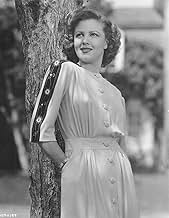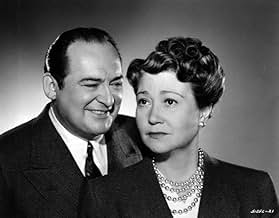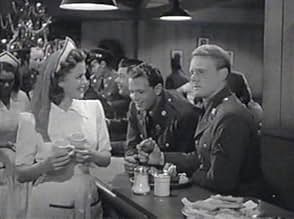CALIFICACIÓN DE IMDb
6.6/10
511
TU CALIFICACIÓN
Agrega una trama en tu idiomaA Washington official courts a society matron who is trying to ignore the effects of World War II.A Washington official courts a society matron who is trying to ignore the effects of World War II.A Washington official courts a society matron who is trying to ignore the effects of World War II.
- Nominado a 1 premio Óscar
- 1 premio ganado y 1 nominación en total
Stephen McNally
- Peters
- (as Horace McNally)
Rags Ragland
- Louie
- (as 'Rags' Ragland)
Carl 'Alfalfa' Switzer
- Messenger Boy
- (as Carl Switzer)
Eddie Acuff
- Soldier in Canteen
- (sin créditos)
- Dirección
- Guionista
- Todo el elenco y el equipo
- Producción, taquilla y más en IMDbPro
Opiniones destacadas
This begins in an elegant manner and is a serious film. It has a fantastic cast, almost entirely made up of character actors. Edward Arnold could be the only one ho ever starred in A pictures, though Fay Bainter, in the title role here, could have been said to also.
Bainter's character lives in a bubble. She's a rich widow in Washington, DC, who refuses to pay attention to the sounds of W.W.II, right up through Pearl Harbor. Her daughter (Jean Rogers, not quite believable as a child of privilege) meets a military man, the young Van Johnson. Her alcoholic son is sent off to war by influential Arnold, rather than disgrace Bainter, whom he loves.
Etc.
It works well, even to the end, though it becomes less plausible as it moves toward its resolution. Would patrician Bainter/Hadley really embrace the working class mother-in-law of her daughter to such a degree? Seems unlikely.
There are strange overtones of homosexuality in this movie. At its start we see a bouquet being delivered to Bainter. It evolves that the woman who cuts her hair sent it. Everyone wonders why. Her friend Spring Byington says, "Maybe she's musical!" and all laugh. My understanding from older friends is that this was a code for gay/lesbian in the 1940s.
This could be my imagination, but the bouquet is never explained and w never again hear about, let alone see, the hair stylist.
Regardless, it's an elegant movie that, with a bigger budget, could have been a very fine one.
Bainter's character lives in a bubble. She's a rich widow in Washington, DC, who refuses to pay attention to the sounds of W.W.II, right up through Pearl Harbor. Her daughter (Jean Rogers, not quite believable as a child of privilege) meets a military man, the young Van Johnson. Her alcoholic son is sent off to war by influential Arnold, rather than disgrace Bainter, whom he loves.
Etc.
It works well, even to the end, though it becomes less plausible as it moves toward its resolution. Would patrician Bainter/Hadley really embrace the working class mother-in-law of her daughter to such a degree? Seems unlikely.
There are strange overtones of homosexuality in this movie. At its start we see a bouquet being delivered to Bainter. It evolves that the woman who cuts her hair sent it. Everyone wonders why. Her friend Spring Byington says, "Maybe she's musical!" and all laugh. My understanding from older friends is that this was a code for gay/lesbian in the 1940s.
This could be my imagination, but the bouquet is never explained and w never again hear about, let alone see, the hair stylist.
Regardless, it's an elegant movie that, with a bigger budget, could have been a very fine one.
In Washington, D. C., wealthy widow Mrs. Stella Hadley (Fay Bainter) is throwing herself a birthday party. It's Dec 7, 1941. Pearl Habor happens and everyone rushes off to their duty. Stella refuses to let the war interfere with her life. She demands that her son Ted return home for the Christmas holidays, war or no war. Instead, he is going to the front. Her daughter Pat starts dating soldier Mike.
This is war propaganda, pure and simple. Mrs. Hadley is certainly a specific role during that time. It's interesting that she's clueless rather than being callous. It allows for a little bit of humor and also her later character growth. It's wartime.
This is war propaganda, pure and simple. Mrs. Hadley is certainly a specific role during that time. It's interesting that she's clueless rather than being callous. It allows for a little bit of humor and also her later character growth. It's wartime.
With the war raging by 1942, this film was certainly timely. It really showed the isolationists what they were-selfish in every sense of the word.
As Mrs. Hadley, Faye Bainter etched an unforgettable character in a truly under-rated performance. Her late husband, a newspaper editor, wanted one-term presidencies and not only opposed FDR's policies, but was totally against his running for a 3rd term in 1940. Surrounded by memorabilia of Republican administrations, the war and everything else occurring in the film is a direct threat to Mrs. Hadley's very existence. Her erudite manner and apparent sophistication,in a world of snobby people looking down on others, is depicted beautifully. She even, as an over-protective mother, tries to get her son out of serving in the army.
Bainter is supported by a marvelous cast. Jean Rogers is the daughter who will buck her to marry army private Van Johnson. In the same year that he played the son to the Miniver's, Richard Ney is convincing as the alcoholic son who finds his way out of his mother's orbit by going into the service.
Edward Arnold is an old family friend, who works for the government and makes sure that Ney is drafted to the consternation of Mrs. Hadley.
Then, there is Spring Byington as Cecelia, Bainter's faithful friend who doesn't share her disposition and contempt for others.
Coming from an Oscar nominated turn in "How Green Was My Valley," Sara Allgood is wonderful as Van Johnson's mother, who knows how to deal with Mrs. Hadley. Allgood's Irish brogue and manner serves her well again. It should be noted that Allgood really should have won the supporting Oscar for 'Valley.'
The film works well because it ultimately deals with the human spirit. No matter what our differences, national emergency must bring us together to fight for the American ideal against totalitarianism.
A memorable film dealing with an epic time in history.
As Mrs. Hadley, Faye Bainter etched an unforgettable character in a truly under-rated performance. Her late husband, a newspaper editor, wanted one-term presidencies and not only opposed FDR's policies, but was totally against his running for a 3rd term in 1940. Surrounded by memorabilia of Republican administrations, the war and everything else occurring in the film is a direct threat to Mrs. Hadley's very existence. Her erudite manner and apparent sophistication,in a world of snobby people looking down on others, is depicted beautifully. She even, as an over-protective mother, tries to get her son out of serving in the army.
Bainter is supported by a marvelous cast. Jean Rogers is the daughter who will buck her to marry army private Van Johnson. In the same year that he played the son to the Miniver's, Richard Ney is convincing as the alcoholic son who finds his way out of his mother's orbit by going into the service.
Edward Arnold is an old family friend, who works for the government and makes sure that Ney is drafted to the consternation of Mrs. Hadley.
Then, there is Spring Byington as Cecelia, Bainter's faithful friend who doesn't share her disposition and contempt for others.
Coming from an Oscar nominated turn in "How Green Was My Valley," Sara Allgood is wonderful as Van Johnson's mother, who knows how to deal with Mrs. Hadley. Allgood's Irish brogue and manner serves her well again. It should be noted that Allgood really should have won the supporting Oscar for 'Valley.'
The film works well because it ultimately deals with the human spirit. No matter what our differences, national emergency must bring us together to fight for the American ideal against totalitarianism.
A memorable film dealing with an epic time in history.
Wonderful little film about a sheltered society woman's difficulty in adjusting to the changes wrought on her life by WWII. Mrs. Hadley sees the war as a personal disruption to the routine of her existence and she is not happy about it!
The great thing about these lower budget films from the major studios was that it provided opportunities for great actresses like Fay Bainter to top line films in between providing support in A pictures.
She is marvelous as the unthinkingly selfish Mrs. Hadley making her obdurate obliviousness palatable if not understandable. As good as she is she is fortunate to be surrounded by some of the best character actors and actresses working at that time. Spring Byington flutters and dithers as only she could while Sara Allgood is all warm, bosomy kindness and understanding as an impossibly young Van Johnson's mother. Connie Gilchrist is a stitch as the family cook and Isobel Elsom is very tender in a small part as Fay's rival. On top of that the great Edward Arnold in good guy mode here is very good as an incredibly patient suitor of the difficult Mrs. Hadley.
Due to the professionalism of the cast and good pacing by the director this is a far more enjoyable film than the slim premise would seem to promise. An undiscovered treasure.
The great thing about these lower budget films from the major studios was that it provided opportunities for great actresses like Fay Bainter to top line films in between providing support in A pictures.
She is marvelous as the unthinkingly selfish Mrs. Hadley making her obdurate obliviousness palatable if not understandable. As good as she is she is fortunate to be surrounded by some of the best character actors and actresses working at that time. Spring Byington flutters and dithers as only she could while Sara Allgood is all warm, bosomy kindness and understanding as an impossibly young Van Johnson's mother. Connie Gilchrist is a stitch as the family cook and Isobel Elsom is very tender in a small part as Fay's rival. On top of that the great Edward Arnold in good guy mode here is very good as an incredibly patient suitor of the difficult Mrs. Hadley.
Due to the professionalism of the cast and good pacing by the director this is a far more enjoyable film than the slim premise would seem to promise. An undiscovered treasure.
As Fay Bainter in the title role in The War Against Mrs. Hadley celebrates her birthday with family and close friend Edward Arnold, the war raging in Europe and Asia seems all too far away. Arnold in fact works for the War Department and is involved in those negotiations with those Japanese emissaries. But Bainter's birthday is December 7 and when her favorite symphony is interrupted on the radio with news of Pearl Harbor, this Republican dowager's world is rudely rearranged.
This film is a snapshot in time of the home front in Washington, DC during the early years of World War II. Bainter is quite specifically identified as a Republican whose husband had opposed many of the New Deal policies and she reflects his views. In fact she refuses to read the newspaper that her husband had sold to Isobel Elsom who changed the editorial policy to pro-Roosevelt. And the many activities of the home front during the war years like blackouts are just something to put up with.
Both her children Jean Rogers and Richard Ney are rebelling under her genteel but iron thumb. Rogers works in the USO and falls for working class soldier Van Johnson and Ney first balks, but then wants to go to war and do his bit. Ney works for Arnold in the War Department and Arnold letting him go causes a breach between him and Bainter.
In real life Fay Bainter was married to a military man and her attitudes were the opposite of Mrs. Hadley. In fact she and her husband are buried at Arlington National Cemetery. She gives a dignified and restrained performance as a woman who has reality crash in on her.
Arnold's character is interesting and quite within the times. FDR in 1940 after the fall of France appointed establishment Republicans Henry L. Stimson and Frank Knox as Secretaries of War and the Navy respectively. Arnold is clearly a Stimson man brought in like his boss as part of a united war effort. Something the 43rd president did not seek after 9/11. How different our history in the past eleven years might have been if he had. But FDR was the best example of how to make a war coalition.
I must also single out Spring Byington playing one of her patented airhead roles as Bainter's friend. Reality falls in on her as well, but it was a struggle.
The War Against Mrs. Hadley is a curious and dated epic. Even with an attack right here on mainland USA you couldn't make this kind of film today. Too many things working against it.
This film is a snapshot in time of the home front in Washington, DC during the early years of World War II. Bainter is quite specifically identified as a Republican whose husband had opposed many of the New Deal policies and she reflects his views. In fact she refuses to read the newspaper that her husband had sold to Isobel Elsom who changed the editorial policy to pro-Roosevelt. And the many activities of the home front during the war years like blackouts are just something to put up with.
Both her children Jean Rogers and Richard Ney are rebelling under her genteel but iron thumb. Rogers works in the USO and falls for working class soldier Van Johnson and Ney first balks, but then wants to go to war and do his bit. Ney works for Arnold in the War Department and Arnold letting him go causes a breach between him and Bainter.
In real life Fay Bainter was married to a military man and her attitudes were the opposite of Mrs. Hadley. In fact she and her husband are buried at Arlington National Cemetery. She gives a dignified and restrained performance as a woman who has reality crash in on her.
Arnold's character is interesting and quite within the times. FDR in 1940 after the fall of France appointed establishment Republicans Henry L. Stimson and Frank Knox as Secretaries of War and the Navy respectively. Arnold is clearly a Stimson man brought in like his boss as part of a united war effort. Something the 43rd president did not seek after 9/11. How different our history in the past eleven years might have been if he had. But FDR was the best example of how to make a war coalition.
I must also single out Spring Byington playing one of her patented airhead roles as Bainter's friend. Reality falls in on her as well, but it was a struggle.
The War Against Mrs. Hadley is a curious and dated epic. Even with an attack right here on mainland USA you couldn't make this kind of film today. Too many things working against it.
¿Sabías que…?
- TriviaMGM arranged that the world premiere at the Lowe's Capitol Theatre in Washington, DC in September, 1942 would be a War Bond drive, with better seats going to those that bought more bonds. The effort raised $1,822,675 ($27.24M in 2017).
- ErroresWhen Stella goes to see Elliot at the Muntions Building, the view from his office window is of the Capitol Building and it is very close. This is not remotely possible. The Muntions Building was built on Constitution Avenue on the Mall between the Lincoln Memorial and the Washington Monument--roughly where the Vietnam Memorial now stands. In addition, the similar Main Navy Building stood between the Muntions Building and the Capitol.
- Citas
Cecilia Talbot: [on being ordered to observe the blackout] Oh dear! It's just like the French Revolution!
- ConexionesFeatured in Personalities (1942)
- Bandas sonorasHappy Birthday
(1893) (uncredited)
Written by Mildred J. Hill and Patty S. Hill
Sung a cappella by Carl 'Alfalfa' Switzer
Also sung a bit by Halliwell Hobbes
Selecciones populares
Inicia sesión para calificar y agrega a la lista de videos para obtener recomendaciones personalizadas
- How long is The War Against Mrs. Hadley?Con tecnología de Alexa
Detalles
- Fecha de lanzamiento
- País de origen
- Idioma
- También se conoce como
- The War Against Mrs. Hadley
- Locaciones de filmación
- Cal-Aero Academy, Chino Airport - 7000 Merrill Avenue, Chino, California, Estados Unidos(Cal-Aero Academy closed 1944; airport called Cal-Aero Field when filmed)
- Productora
- Ver más créditos de la compañía en IMDbPro
Taquilla
- Presupuesto
- USD 307,000 (estimado)
- Tiempo de ejecución1 hora 26 minutos
- Color
- Relación de aspecto
- 1.37 : 1
Contribuir a esta página
Sugiere una edición o agrega el contenido que falta

Principales brechas de datos
By what name was Templada al fuego (1942) officially released in India in English?
Responda
























